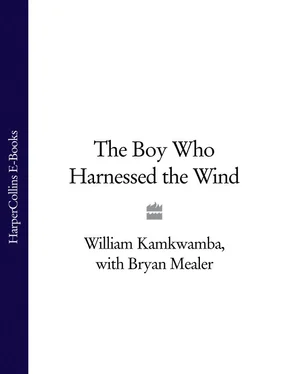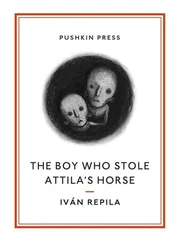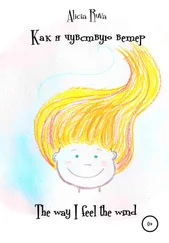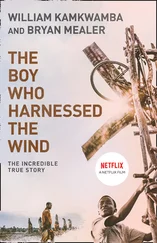One morning, the Ngoni came up the mountain dressed in animal skins, holding massive shields in one hand and spears in the other. But of course, Chief Mwase’s warriors had spotted them from miles away. By the time the Ngoni reached the hill, the Chewa warriors had disguised themselves as green grass and slayed the intruders with knives and spears. The last man to die was Chief Nawambe. For this reason, the mountain was changed from the Rock of the Edible Flies to Nguru ya Nawambe, which means simply “The Deadly Defeat of Nawambe.” This same hill now casts a long shadow over the city of Kasungu, just near my village.
THESE STORIES HAD BEEN passed down from generation to generation, with my father having learned them from my grandpa. My father’s father was so old he couldn’t remember when he was born. His skin was so dry and wrinkled, his feet looked like they were chiseled from stone. His overcoat and trousers seemed older than he was, the way they were patched and hung on his body like the bark of an ancient tree. He rolled fat cigars from maize husks and field tobacco, and his eyes were red from kachaso, a maize liquor so strong it left weaker men blind.
Grandpa visited us once or twice a month. Whenever he emerged from the edge of the trees in his long coat and hat, a trail of smoke rising from his lips, it was as if the forest itself had taken legs and walked.
The stories Grandpa told were from a different time and place. When he was young—before the government maize and tobacco estates arrived and cleared most of our trees—the forests were so dense a traveler could lose his sense of time and direction in them. Here the invisible world hovered closer to the ground, mixing with the darkness in the groves. The forest was home to many wild beasts, such as antelope, elephant, and wildebeest, as well as hyenas, lions, and leopards, adding even more to the danger.
When Grandpa was a boy, his grandmother was attacked by a lion. She was working in her fields at the forest’s edge, scaring away some monkeys, when a female lion came upon her. Villagers heard her cries and quickly sounded the drum—not the fast, rhythmic beat for dances or ceremonies, but something slow and serious. They call this emergency beat the musadabwe, meaning, “Don’t ask questions, just come!” It’s like dialing 911, but instead of police, you’re calling other villagers.
By the time Grandpa and others arrived with their spears and bows and arrows, it was too late. They saw the lion—its body the size of a cow—drag his grandmother into the thorny trees, then toss her body into the bush like a mouse. It then turned and faced its challengers, let out a terrible roar, and disappeared with its kill. The poor woman’s body was never recovered.
Grandpa says that once a lion gets a taste for human blood, it won’t stop until it’s eaten an entire village. So the next morning someone notified the British authorities, who still controlled our country. They sent soldiers into the forest and shot the lion. Its body was then displayed in the village square for all to see.
Not long after, Grandpa was hunting alone in the forest and came upon a man who’d been bitten by a cobra. The snake had been hiding in the trees and struck the man’s head as he passed. His skin quickly turned gray, and minutes later, he was dead. Grandpa alerted the nearest village, who arrived with their witch doctor. The wizard placed one foot atop the dead man’s chest and tossed some medicines into the forest. Seconds later, the moist ground came alive as hundreds of cobra slithered out from the shadows and gathered around the corpse, hypnotized by the spell.
The wizard crouched on the dead man’s chest and drank a cup of magic porridge, which flowed through his feet and into the lifeless body. The dead man’s fingers began to move, then his hands.
“Let me up,” he said, then stood and faced the army of serpents.
Together, they checked the fangs of every cobra in attendance, searching for the one that had killed the man. Usually, the wizard would quickly cut off the head of the guilty snake, but this time, the dead man took pity and allowed the cobra to live. For his services, the wizard was paid three British pounds. My grandpa saw this with his own eyes.
When my father was a young man, he often went hunting with his father. Even then, the forest was so dangerous that hunters observed a sacred ritual before their outings. Hunts were usually initiated by one man, the mwini chisokole, or owner of the hunt, who called together all the willing men from the surrounding villages. The owner decided where and when the hunt would take place, and in the event of a kill, he’d receive the choicest portion of the meat, usually the hindquarter. Grandpa was often this person.
On the night before the hunt, the leader wasn’t allowed to sleep with his wife, not even in the same room. The purpose was to keep the man’s focus and attention as sharp as possible, and to guarantee a solid night’s rest. Losing focus made you careless in the forest, and worst of all, left you open to bewitching. That night, sleeping alone at a neighbor’s house, or in a separate hut with his sons, the leader would boil a pot of red maize mixed with certain roots and medicines, which he’d distribute the following morning to each hunter in the party. This was part of the magic, because everyone believed this protected them from danger.
Before setting out, the hunters also instructed their wives to stay indoors until the hunt was over, preferably lying in bed and sleeping. They thought this would cause the animals to sleep as well, allowing the hunters to sneak up on them with ease.
WALKING THROUGH THE FOREST as a boy, I didn’t worry so much about cobras or lions, since most of them had vanished. But other dangers were waiting in the forests that remained, and along the quiet, empty fields where the ghosts of trees seemed to whisper their sadness. Walking there alone, one of my greatest fears was the Gule Wamkulu.
The Gule Wamkulu were a secret gang of dancers. They performed at the chief’s request at funerals and initiation ceremonies, when many Chewa boys become men. The Gule Wamkulu were said to be the spirits of our dead ancestors, resurrected from the afterworld and sent to roam the earth. No longer human, they shared the skin of animals, and their faces resembled the beasts of hell—twisted devil birds and demons howling in fright.
When the Gule Wamkulu performed, you dared to watch only from a distance. Often they appeared from the bush walking on stilts, towering above the crowd and screaming in different tongues. Once, I even saw one of them climb a blue gum pole while upside down, like a spider. And when they danced, one thousand men seemed to inhabit their bodies, each moving in the opposite direction.
When the Gule Wamkulu weren’t performing, they traveled the forests and marshes looking for young boys to take back to the graveyards. What happened to you there, I never wanted to know. It was bad luck to even speak about the Gule Wamkulu. And God help you if you were ever caught doubting them, saying, “Look at their hands, they have five fingers like me. These guys are not real.” Doing this would surely get you bewitched, and since the Gule Wamkulu answered only to the chief, there’d be no one to defend you. When they appeared in the village, every woman and child dropped what they were doing and ran.
Once when I was very young, a magic dancer appeared in our courtyard, strutting like a cock and hissing like a snake. His head was wrapped in a flour sack with a black hole for a mouth and a long trunk for a nose. My mother and father were in the fields, so my sisters and I ran for the trees, only to watch this passing ghost steal one of our chickens.
(Donkeys are the only creatures not afraid of Gule Wamkulu. If the donkey sees one of these dancers, it will chase them into the bush and kick them with its mighty legs. Don’t ask me why, but the donkey is very brave.)
Читать дальше












